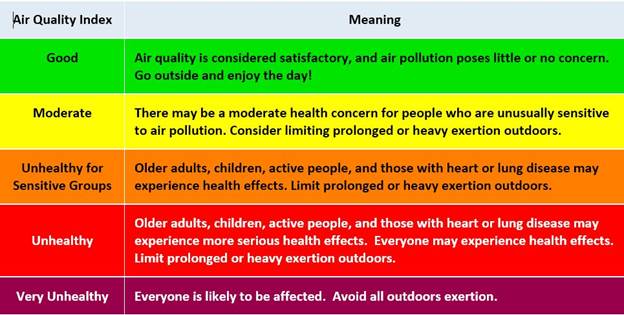From Harris Regional Hospital:
Wildfires, Smoke and Your Health
By Angela Connaughton, MD
Harris Pulmonary and Sleep CenterWildfires have been occurring in the western region of North Carolina, producing dense smoke and reducing visibility. Healthy individuals are not at major risk from smoke resulting from these wildfires. However, it is a good idea to avoid breathing smoke if at all possible.
Smoke is made up of a complex mixture of gases and fine particles produced when wood and other organic matter burn. The biggest health threat from smoke comes from fine particles. These microscopic particles can get into the eyes and respiratory system, where they can cause health problems such as burning eyes, runny nose and illnesses such as bronchitis. Fine particles also can aggravate chronic heart and lung diseases and are even linked to premature deaths in people with these conditions.
Who Might Be Affected?
If you have heart or lung disease, such as congestive heart failure, angina, chronic obstructive pulmonary disease (COPD), emphysema or asthma, you may experience health effects earlier and at lower smoke levels than healthy people.
Adults over age 65 are more likely to be affected by smoke, possibly because they are more likely to have heart or lung diseases than younger people.
Children of age 18 or less also are more susceptible to smoke for several reasons: their respiratory systems are still developing; they breathe more air per pound of body weight than adults; and they are more likely to be active outdoors.
When smoke levels are high enough, even healthy people may experience some of these symptoms.
Tips to Protect Your Health
Pay attention to local air quality reports. Stay alert to any news coverage or health warnings related to smoke. The Environmental Protection Agency’s (EPA) Air Quality Index (AQI) can be found on line. The AQI, based on data from local air quality monitors, provides color-coded maps that represent daily air quality in each state or region of the United States. The color coding on the map is then coordinated with a chart that provides recommendations regarding potential exposures for different groups of people (see chart below). As smoke gets worse, the concentration of particles in the air increases and so do the risks of exposure.
The National Interagency Fire Center (NIFC) and National Weather Service under the National Oceanic and Atmospheric Administration (NOAA) also provide useful information regarding the location of fires, anticipated weather conditions and local response to the fires. These can be found under www.NIFC.gov and www.NOAA.gov websites. Maps of the fire locations and perimeters can be found at www.geomac.gov.
Use common sense. If it appears smoky outside or the visibility is poor, it is probably not a good time to rake leaves or go for a run. And it is probably not a good time for children to play outdoors.
If you are advised to stay indoors, take steps to keep indoor air as clean as possible. Keep windows and doors closed, use the air conditioner if the house is too warm. Keep the fresh air intake closed and the filter clean to prevent bringing additional smoke inside. Note: If you don’t have an air conditioner, staying inside with the windows closed may be dangerous in extremely hot weather. In these cases, seek alternative shelter.
Help keep particle levels inside lower. When smoke levels are high, avoid using anything that burns, such as wood stoves, fireplaces, gas logs, gas stoves — even candles! Avoid vacuuming, which can stir up particles already inside the home. Avoid smoking tobacco products or any other product inside the home, as this may increase the risk of smoke-related health issues, both acutely and chronically.
If you have heart or lung disease, if you are an older adult, or if you have children, talk with your doctor about whether and when you should leave the area. When smoke is heavy for a prolonged period of time, fine particles can build up indoors even though you may not be able to see them.
Air cleaners can help indoors. Some room air cleaners can help reduce particle levels indoors, as long as they are the right type and size for your home. Note: Avoid using an air cleaner that generates ozone which will increase the pollution in the home.
For more information about home air cleaners, go to: https://www.epa.gov/indoor-air-quality-iaq/guide-air-cleaners-home
Dust masks aren’t enough!
Paper “comfort” or “dust” masks — the kinds you commonly can buy at the hardware store — are designed to trap large particles, such as sawdust. These masks generally will not protect your lungs from the fine particles in smoke.
Important Restrictions
Several agencies have imposed several important restrictions. For example, the Nantahala National Forest put several fire restrictions into place, including:
· No building, maintaining, attending or using a fire, campfire or stove fire outside of developed campgrounds where a fee is paid.
· No portable lanterns, stoves or heating equipment that utilize gas or pressurized liquid fuel. Charcoal fires are not allowed.
· Permissible fires must be confined to metal fire rings and grills that are provided in the National Forest only at specific locations.
Summary
· Inform yourself regarding local wildfires, smoke conditions and important restrictions.
· Take appropriate precautions based on your age, health conditions and proximity to fires and smoke. Consult with your health provider if you have chronic heart or lung disease for recommendations regarding exacerbations during smoke exposures.
· Use common sense.
· If you are having increasing difficulty breathing or having worsening of a respiratory condition, consider finding an alternative location until the smoke in the area is resolved or seek help at a local emergency department or urgent care.





You can easily transform the walls of your home or office into a permanent air purification system, simply by mixing the ionic paint additive by Air-ReNu with paint and apply the mixture to the walls of your home or office. One application eliminates offensive odors such as cat urine, tobacco smoke, pet dander, toxins, and will continue to remain effective for 8 to 12 years.